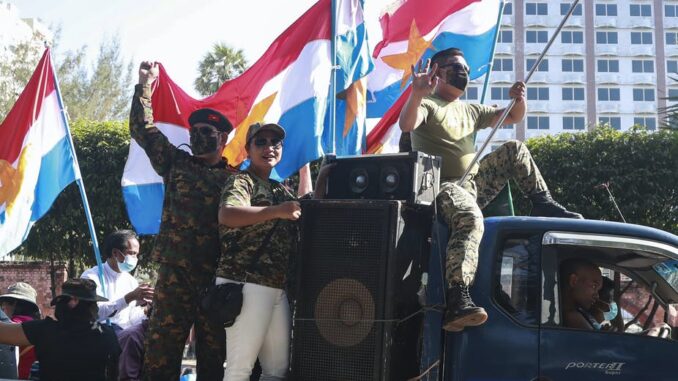
Gabby Molina ’21
In the early morning of February 1, 2021, news broke that control of the state had been transferred to commander-in-chief Min Aung Hlaing. Since then, the Myanmar military have announced replacements for various ministers and government officials. According to the BBC, under a newly reinstated dictatorship, protesters in the streets of Yangon, the largest city in Myanmar, can feel “their hard-fought battle for democracy” has been lost.
This new leader, Min Aung Hlaing, has received condemnation for his role in the military’s attacks against ethnic minorities in Myanmar, and was noted in a report from the UN Human Rights Council on the genocide of Rohingya Muslims. In his long career in the military, Aung Hlaing became the commander of the Bureau of Special Operations-2 in 2009, and would oversee operations in the north-east, which led to thousands of ethnic minorities fleeing their home country, according to BBC. Additionally, the new leader of Myanmar had faced multiple allegations of murder, rape, and arson, but still became the joint chief of staff in August 2010.
Previously in power was the democratically elected leader and Nobel Peace Prize laureate Aung San Suu Kyi, who fought hard for democracy throughout Myanmar’s long battle with military dictatorship. After fifteen years of house arrest, Suu Kyi and her party, the National League for Democracy, dealt an embarrassing defeat to the military, who, despite their poor election results, are guaranteed a minimum of ¼ of all seats in the parliament. In response to their defeat, the military has called the November election fraudulent, even rigged, according to NPR. However, local and international observers have disputed these claims, according to The Hill.
But, on February 1, Suu Kyi and other pro-democracy leaders were ousted, and taken into custody, many without actual charges brought against them. Human Rights Watch has reported that over 350 people––protesters and officials alike––have been detained since the coup occurred. Suu Kyi, however, is facing charges, one for importing unregistered walkie-talkies, which, according to NPR, has been viewed by many as a pretext for her arrest, and another, which charges her with violating a law previously used to prosecute those who have violated COVID-19 restrictions. Both of these, however, are under a revised penal code, which was recently amended to allow for detention without a court order.
A spokesperson for the new government held a press conference on Tuesday, February 16, where it was promised that Myanmar would hold another election, though a timetable was not provided. In the conference, the spokesperson stated, “our objective is to hold an election and hand power to the winning party,” as reported by NPR. In this same conference he told reporters that no one was actually detained or arrested — they are at home for their own protection.
Protesters in Myanmar have gathered in major cities to protest, crying out for the reinstatement of their democratically elected leader Suu Kyi. The military has cracked down on these protests, blocking access to social media and the Internet overall, with talks of installing a firewall to prevent and restrict access, according to NPR. The U.N. has even released a statement, noting that the military and police have used live bullets, as well as rubber bullets, against protesters. From “growing reports and photographic evidence” of live ammunition, the United Nations investigator has called on the Security Council to impose sanctions against Myanmar, which has occurred previously in similar circumstances, says NPR. Additionally, nighttime raids and arrests have become commonplace, as the military suspended multiple laws that would protect citizens from unlawful search and seizure of their possessions, among other violations of their rights.
On February 11, the Biden administration announced new sanctions against 10 military leaders in Myanmar who are believed to be behind the coup, including Commander-in-Chief Min Aung Hlaing. as announced in a press release from the Department of the Treasury. Secretary Yellen stated that the department “stands with the people of Burma — and we are doing what we must to help them in their effort.” Additionally, both the U.K and Canada have imposed sanctions against military generals, which has been applauded by Secretary of State Antony Blinken, who wants “the international community to send a unified message”, according to The Hill.
With these sanctions in place and a promise of a new election, there is hope that Myanmar will once again see their democratically elected leaders back in power.